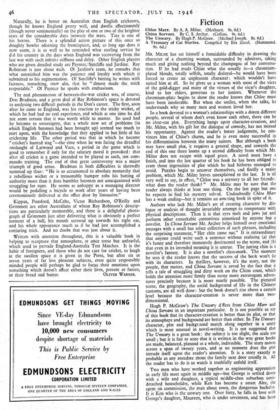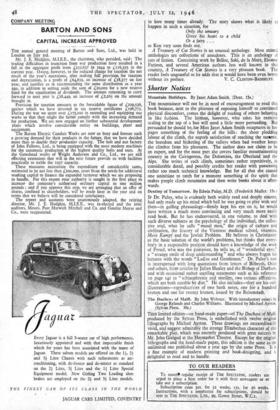Fiction
Chloe Meer. By A. A. Milne. (Methuen. 9s. 6d.) China Servant. By C. S. Archer. --(Collins. 9s. 6d.) The Unwary. By Hugh P. McGraw. (Michael Joseph. 8s. 6d.) A Treasury of Cat Stories. Compiled by Era Zistel. (Hammond. 9s. 6d.) MR. MILNE has set himself a formidable difficulty in drawing the character of a charming woman, surrounded by admirers, taking much and giving nothing beyond the champagne of her conversa- tion. If he had made. Chloe what she usually is—a chromium- plated blonde, totally selfish, totally disloyal—he would have been forced to create an unpleasant character : which wouldn't have
suited him at all. So he gives us a woman with most of the vices of the gold-digger and many of the virtues of the vicar's daughter, kind to her elders, generous to her juniors. Whenever the
chromium-plate begins to show the reader knows that Chloe must have been intolerable. But when she smiles, .when she talks, he understands why so many men and women loved her.
In a book devoted to a woman's relationships with a dozen different people, several of whom don't even know each other, there can be no clear-cut plot. Everything hangs upon character-creation, and Mr. Milne, with his gift for the dialogue of comedy, has not missed his opportunity. Against the reader's boner judgement, he con- vinces him of Chloe's charm, and he is even more successful in his differentiation between the many suitors. But although a book may have small plot, it requires a general shape, and towards the end of this one there looms up a second difficulty from whiCh Mr. Milne does not escape with equal grace. A novel must have a finish, and into the last quarter of his book he has been obliked to cram those ingenuities of plot which he had hitherto managed to avoid. Puzzles begin to uncover themselves, and finally a major problem, which Mr. Milne leaves unexplained to the last. It is all very well to say, in effect, " Chloe was a mystery to all her friends : what does the reader think? " Mr. Milne may be sure that the reader always thinks at least one thing. On the last page but one he expects to find his mystery solved. Undoubtedly Chloe Marr has a weak ending—but it remains an amusing book in spite of it.
Authors who lack Mr. Milne's art of creating character by dia- logue or analysis of thought invariably attempt to compensate with physical descriptions. Then it is that eyes melt and jaws jut and perform other remarkable contortions unnoticed by anyone but a novelist. In China Servant Mr. Archer helps himself over emotional passages with a small but select collection of such phrases, including the surprising statement, " Her chin came out." It is extraordinary that anyone could write such a sentence without realising (a) that it's funny and therefore immensely detrimental to the scene, and (b) that even in its intended meaning it is untrue. The jutting chin is a novelist's fantasy. It is also a novelist's class-mark, The moment he sees it the reader knows that the success of the book won't lie with 'its characters. In thrillers, however, it's the story, not the people, that matter, and China Servant is saved by the fact that it tells a tale of smuggling and dirty work on the China coast, which
holds the attention more than many more extravagant adven- tures precisely because it is more nearly possible. The pictured scene, the geography, the social background of life in the' Chinese customs, are all well done : but the book doesn't rise above a certain level because the character-creation is never more than two- dimensional. - Hugh P. McGraw's The Unwary infers from Chloe Marr and China Servant in an important particular. It is not possible to- say of this book that its character-creation is better than its plot, or that its atmosphere and background are better than either. In The. Unwary character, plot and background march along together in a unity which is most unusual in novel-writing. It ,is not suggested that The Unwary is a great'book: the subject is too slight, the scale too small ; but it is fair to state that it is written in the way great books are made, balanced, planned as a whole, indivisible. The story moves across a span of twenty years, and at no moment does the plot intrude itself upon the reader's attention. It is a story exactly as probable as any anecdote about the family next door usually is. All the reader has to do is to watch it truthfully unfold itself.
Two men who have worked together as engineering apprentices in early life meet again in middle age—but George is settled down with a wife and daughter, a typical middle-class suburban semi- detached householder, while Ken has become a smart Alec, the agent on commission, the man about town, the dangerous bachelor. It is Ken who is the unwary one. Over forty, he falls in love with George's daughter, Maureen, who is under seventeen, and has been
in love many times already. The story shows what is likely to happen in such a situation, for Only the unwary Gives his heart to a child . Or a fairy . . .
as Ken very soon finds out.
A Treasury of Cat Stories is an unusual anthology. Most animal anthologies are collections of anecdotes. This is an anthology of cats of fiction. Containing work by Belloc, Saki, de la Mare, Eleanor Farjeon, and several American authors less well known in this country, A Treasury of Cia Stories is a very pleasant 'book. The reader feels ungrateful as he adds that it would have been even better































 Previous page
Previous page